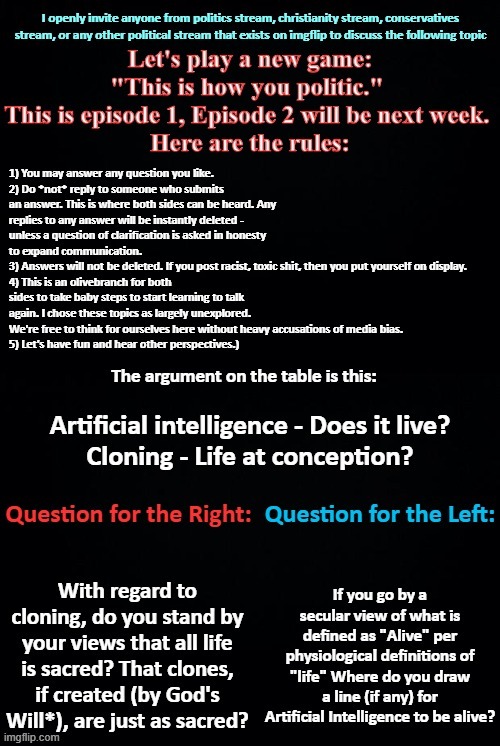I’ll answer the question posed to the Left.
This is an updated version of an older debate involving animal consciousness — what rights are possessed by animals, and what obligations we owe toward them. Beyond the scope for me to discuss all that, but it’s a fascinating topic.
AI chatbots have become quite sophisticated lately, able to churn out 5-paragraph essays that would fool most graders. There are also stories of people, even software engineers, getting “duped” into proclaiming that the chatbot on the other end is conscious, even when they know that they’re just talking to a machine. This is a pretty disturbing harbinger for how humans could soon be manipulated by other humans operating AIs, for political or criminal or fraudulent purposes.
We can go back several decades to when computer AIs became sophisticated enough to beat World Chess Champions. Did that mean they were “alive” or “conscious”? No, it just meant the software engineers designed a program that was better able at solving “the puzzle” of chess.
Instant-messaging, essay composition, future intelligence challenges for AI — they can also be thought of as “puzzles.” While an AI script can be written to excel at a discrete challenge, it may be a long time, perhaps never, that an AI can be coded to excel at *all* the tasks that a typical human being can do. Even then, would it really be a consciousness on the level of a human being, or just excelling at the task of “human being”?
As much as we might *wish* for a creation of ours to become “alive” — the same impulse that has us feverishly (and so far, fruitlessly) scanning the galaxy for signs of intelligent life elsewhere — I’m skeptical of claims that it can really be done, let alone any time soon.
In the meantime, we are failing badly at caring for billions of people around the world who are indisputably alive, as well as the *future* generations of tens of billions of humans who stand to be greatly impacted by the environmental decisions we’re making right now.
Let’s get humanism right first. Then we can work on “rights” for AI, if the technology ever reaches that point.
Reference:
https://www.iflscience.com/the-eliza-effect-how-a-chatbot-convinced-people-it-was-real-way-back-in-the-1960s-64155
